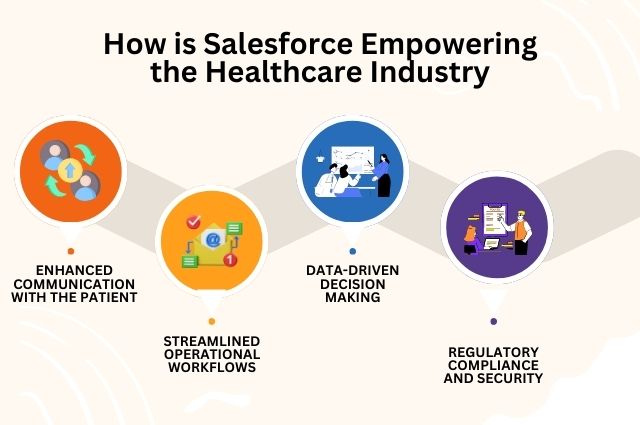
Salesforce For the Healthcare Industry
Technology drives innovation across sectors, and the healthcare industry is at the forefront of transformation. Amidst patient care, administrative tasks, and regulatory compliance complexities, healthcare providers increasingly use advanced solutions to streamline operations and enhance patient experiences. Salesforce, a global leader in customer relationship management (CRM) software, emerges as a perfect partner.
In this blog, we will look into the transformative impact of Salesforce on the healthcare industry, exploring its capabilities, benefits, and potential for reshaping the future of healthcare delivery.
Understanding the Healthcare Landscape
The healthcare industry’s ecosystem is characterized by complicated workflows, rigid regulations, and the importance of delivering high-quality patient care. From patient registration and appointment scheduling to clinical documentation and post-care follow-up, healthcare providers struggle with many challenges that demand strong solutions. Additionally, the rising emphasis on patient engagement, personalized care, and data-driven decision-making further amplifies the need for innovative technologies to address these evolving demands.
How is Salesforce Empowering the Healthcare Industry
Enter Salesforce—a comprehensive CRM platform renowned for its versatility, scalability, and user-centric design. While traditionally associated with sales and marketing functions, Salesforce’s applicability extends far beyond traditional boundaries, making it an invaluable asset for the healthcare industry.
Here’s how Salesforce is revolutionizing healthcare:

1. Enhanced Communication with the Patient
Salesforce empowers healthcare providers to cultivate meaningful relationships with patients through personalized communication, targeted outreach, and interactive engagement portals. By leveraging Salesforce’s robust analytics and automation capabilities, providers can deliver tailored care plans, health reminders, and seamless access to medical resources, fostering a patient-centric care environment.
2. Streamlined Operational Workflows
It is common for healthcare organizations to struggle with inefficient and inefficient administrative processes. Salesforce’s workflow automation and integration capabilities offer a practical solution, enabling seamless coordination between various departments, streamlined appointment scheduling, and real-time access to critical patient information. This streamlined approach enhances operational efficiency and minimizes administrative burdens, allowing healthcare providers to focus on delivering quality care.
3. Data-Driven Decision Making
Salesforce’s advanced analytics and reporting tools empower healthcare organizations to derive meaningful insights from vast datasets, enabling informed decision-making, predictive analytics, and performance optimization. Whether it’s monitoring patient outcomes, assessing resource allocation, or identifying areas for improvement, Salesforce empowers healthcare providers to drive continuous improvement.
4. Regulatory Compliance and Security
The healthcare industry is governed by strict regulatory frameworks that mandate adherence to privacy, security, and data protection standards. Salesforce’s robust security infrastructure, compliance capabilities, and adherence to industry best practices ensure that healthcare organizations can confidently navigate regulatory complexities. By offering access controls, audit trails, and encryption capabilities, Salesforce provides a secure environment for managing sensitive patient data, fostering trust and compliance within the healthcare ecosystem.
5. Scalability and Adaptability
The dynamic nature of healthcare demands solutions that can evolve with changing needs and emerging trends. Salesforce’s scalable architecture, extensive customization capabilities, and ecosystem of integrated applications enable healthcare organizations to adapt to evolving requirements, scale operations seamlessly, and leverage emerging technologies such as artificial intelligence, telehealth, and IoT to enhance patient care delivery.
Salesforce Features for the Healthcare Industry
1. Patient Relationship Management (PRM)
Salesforce’s PRM capabilities empower healthcare providers to cultivate and nurture patient relationships through personalized interactions, targeted communication, and customized care plans. By centralizing patient data, preferences, and interactions, Salesforce facilitates seamless coordination across care teams, enhancing care continuity and patient satisfaction.
2. Integrated Health Cloud
Salesforce Health Cloud, a specialized offering for the healthcare industry, offers a unified platform for managing patient relationships, clinical data, and operational workflows. With features such as care coordination and patient profile management, Health Cloud streamlines care delivery, facilitates collaboration, and enhances patient outcomes.
3. Analytics and Insights
Salesforce’s advanced analytics tools enable healthcare organizations to derive actionable insights from vast datasets, driving informed decision-making, performance optimization, and predictive analytics. By leveraging real-time data visualization, predictive modelling, and trend analysis, healthcare providers can identify patterns, assess outcomes, and refine care strategies, manage continuous improvement and innovation.
4. Workflow Automation and Integration
Salesforce’s workflow automation capabilities enable healthcare organizations to automate repetitive tasks, streamline administrative processes, and enhance operational efficiency. By integrating different systems, applications, and data sources, Salesforce manages seamless data exchange, enhances teamwork, and facilitates coordinated care delivery.
5. Compliance and Security
In an era characterized by tight regulatory requirements and growing cybersecurity threats, Salesforce’s powerful security infrastructure and compliance capabilities ensure the protection of sensitive patient data, adherence to regulatory standards, and safeguarding healthcare information. With features such as data encryption, access controls, and audit trails, Salesforce reinforces trust, transparency, and compliance within the healthcare ecosystem.
Benefits of Salesforce for Healthcare Providers
1. Enhanced Patient Engagement and Experience
By leveraging Salesforce’s PRM capabilities and Health Cloud functionalities, healthcare providers can deliver personalized, proactive, and patient-centric care experiences, fostering engagement, satisfaction, and loyalty.
2. Operational Efficiency and Productivity
Salesforce’s workflow automation, integration capabilities, and analytics tools enable healthcare organizations to streamline operations, minimize administrative burdens, and optimize resource allocation, driving efficiency, productivity, and cost-effectiveness.
3. Data-Driven Decision-Making
Salesforce’s advanced analytics, reporting, and insights enable healthcare providers to harness the power of data, derive actionable insights, and make informed decisions, fostering evidence-based practice, performance optimization, and continuous improvement.
4. Scalability and Adaptability
With Salesforce’s scalable architecture, extensive customization capabilities, and integrated application ecosystem, healthcare organizations can adapt to evolving requirements, leverage emerging technologies, and future-proof their operations, ensuring agility, resilience, and innovation.
Conclusion
Healthcare has become increasingly dependent on technology as it evolves. With its transformative capabilities, Salesforce emerges as a beacon of innovation, offering healthcare providers a robust platform to enhance patient engagement, streamline operations, drive data-driven insights, and ensure compliance.
CRM Masters as a Salesforce Implementation Partner helps healthcare organizations unlock various opportunities for growth and efficiency. Contact us today to deliver the best care experiences.













